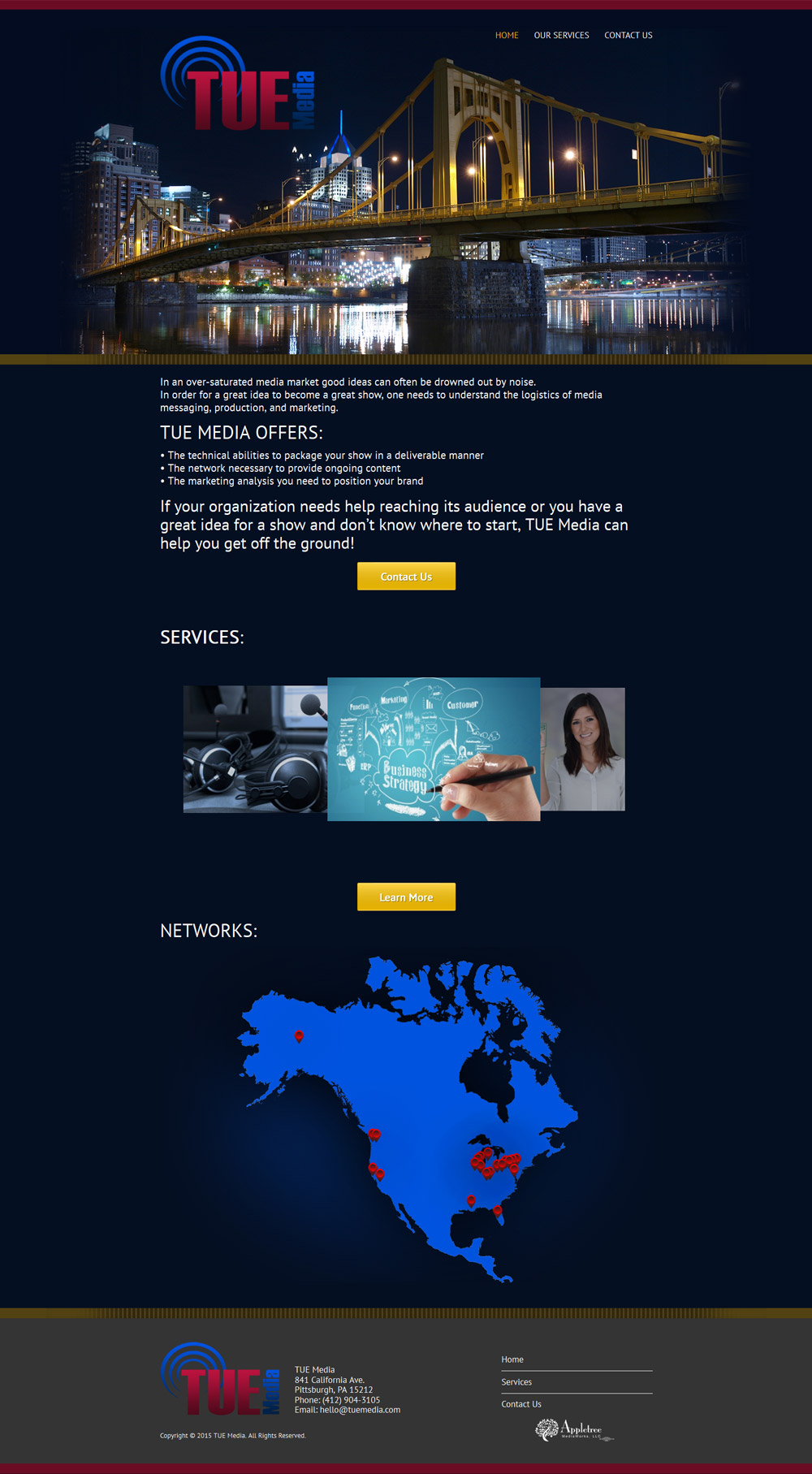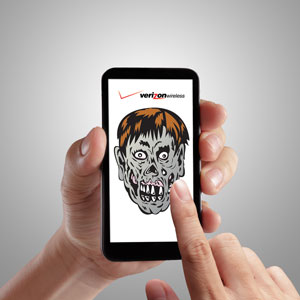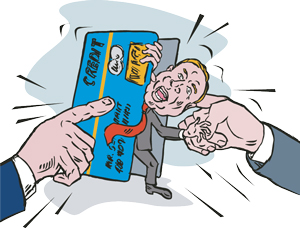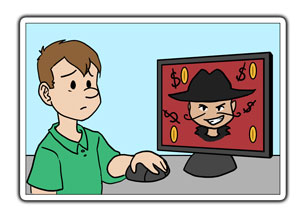TUEMedia
“Working with Appletree MediaWorks is one of the best decisions we have made here at TUEMedia. They do an excellent job at keeping our websites up to date, and always have us covered with the latest updates and features. The team at Appletree MediaWorks does a fantastic job with their layout and custom design, and are always a phone call away when there’s a problem. I couldn’t imagine anyone else handling our media!”
Brittany Sheets
Co-Host and Communications Director
TUEMedia
“With Appletree MediaWorks taking care of our web presence, I can spend my time producing radio instead of worrying about our websites. I work most with Raina, who is friendly and quick to carry out requests. She answers all of my questions, even when that means she has to do extra research for me. I can’t imagine running The Union Edge without Katie and Raina our corner!
TUEMedia is a new site designed for the WordPress framework, pinwheel slider, and Search Engine Optimization. Utilizing a dark background, the design implies elegance and simplicity, showcasing the client’s services and contact information.

Complete Web Site Design, Custom WordPress Integration, Search Engine Optimization.
EMV Chip and PIN Credit Cards
EMV Chip and PIN Credit Cards
You may be receiving new credit cards this summer: the chip and PIN credit cards.
Credit card terminals must be upgraded to the new technology, common in Europe, by October 1st
or will be held liable for Credit Card fraud that happens in their establishment.
The EMV chip and pin cards reduce credit card data theft by containing a chip that encodes data transferred to the merchant. They are also tougher to clone than
magnetic strips.
Reducing, But Not Eliminating, Data Theft
This technology will not do away entirely with data theft. Online fraud and insecure websites that might store your data are not protected by the chip. For that, you need complicated, hard to guess passwords. And since credit card fraud still happens overseas, the system is not fail-safe.
For businesses and companies, this means it is their responsibility to upgrade credit card terminals for the new technology or they will be held liable for credit card fraud.
Verizon Tracking Cookies Turned Zombie
 Remember those permanent Verizon tracking cookies? They’re causing a stir now that they’re being abused. According to Ars Technica, an advertiser named Turn exploited the Verizon tracking cookies to ‘turn back on’ tracking cookies on its own.
Remember those permanent Verizon tracking cookies? They’re causing a stir now that they’re being abused. According to Ars Technica, an advertiser named Turn exploited the Verizon tracking cookies to ‘turn back on’ tracking cookies on its own.
ProPublica released an article about the Zombie Cookies, which used Verizon’s tracking number to re-spawn tracking cookies that users had deleted. Verizon worked damage control by updating its site terms regarding the tracking cookies.
Later, Verizon stated it would expand its opt-out.
For more information visit:
Staff, Ars. “Verizon Will Now Let Users Kill Previously Indestructible Tracking Code.” Web. 3 Feb. 2015. <http://arstechnica.com/information-technology/2015/02/verizon-will-now-let-users-kill-previously-indestructible-tracking-code/>.
My Computer Files are Being Held for Ransom!
 Ransomware
Ransomware
Ransomware, often going by the specific name CryptoLocker or Cryptowall, is a form of malware that, when installed on your computer, encrypts your files and locks them with a key. It then demands a ransom in digital currency within a set amount of time, or the key will be deleted and the files will be inaccessible.
How do you get it Ransomware?
The most common way to become infected with ransomware is to download it inadvertently. When downloaded, the malware sets to work.
Ransomware is often installed by:
- Opening email attachments
- Clicking on banner ads
Why doesn’t my antivirus protection catch Ransomware?
Generally speaking, Ransomware is sneaky malware that slips in to your computer because you have inadvertently installed it. You’ve gone ahead and told your computer to install things, and the malware takes advantage.
[pullquote cite=”- George W.”]”I got an alarmed call from my grandma. She likes playing online games, and clicked on an ad promising her more coins for her game, and moments later she had a message across her screen telling her that her computer had been infected, and that she had to call a number and pay to get the problem resolved. Fortunately, my grandma didn’t have many files on her computer. We wiped the hard drive and reinstalled Windows. But if she’d had important paperwork or photos without any backups, she would have been in a lot of trouble.”[/pullquote][space10]
Who is the biggest target?
This malware can attack anyone, but it causes the most damage to businesses, as they have more valuable data that is not easily replaced. Ransomware is designed to get money by holding your data for ransom.
How do I avoid Ransomware?
Don’t click on things you shouldn’t, or open unexpected files. Functionally we all know this isn’t always the case, however, and sometimes files slip through because they are deceptive.
If you become infected with Ransomware:
- Have secondary backups of important files that are not updated real time, this way, if you need to roll back, you have something unattached that is not infected.
- Unhook your computer from the internet RIGHT AWAY. All files may not have a chance to be encrypted.
[alertbox color=”red” icon=”delete” hide=”0″]
A few companies claim to be able to undo the damage, or have released the keys to unlock encrypted data, but this has not been guaranteed to work in all cases, especially since criminals update the software all the time.
[/alertbox] [space5]
My files are being held for ransom!
If you do find that you have this software, you have two options:
- Pay up and hope the keys they supply you to unlock your data works as indicated. This is risky as it encourages criminals to continue the scam, and since they ARE untrusted people, nothing is guaranteed.
- Wipe computer clean and restore from backup.
Hacking and computer exploits have become more sophisticated and with more businesses online, the risk is real. Precautions and backups are the most surefire way to avoid the worst of damage from hackers, criminals and emergencies when your files are being held for ransom. For more information on internet security, visit our blog at Appletree Mediaworks, LLC.
For more information visit:
– http://www.businessnewsdaily.com/6657-ransomware-cryptolocker-protection.html
– https://www.foolishit.com/cryptoprevent-malware-prevention/
– http://www.welivesecurity.com/2013/12/12/11-things-you-can-do-to-protect-against-ransomware-including-cryptolocker/
– https://blog.malwarebytes.org/intelligence/2013/10/cryptolocker-ransomware-what-you-need-to-know/





